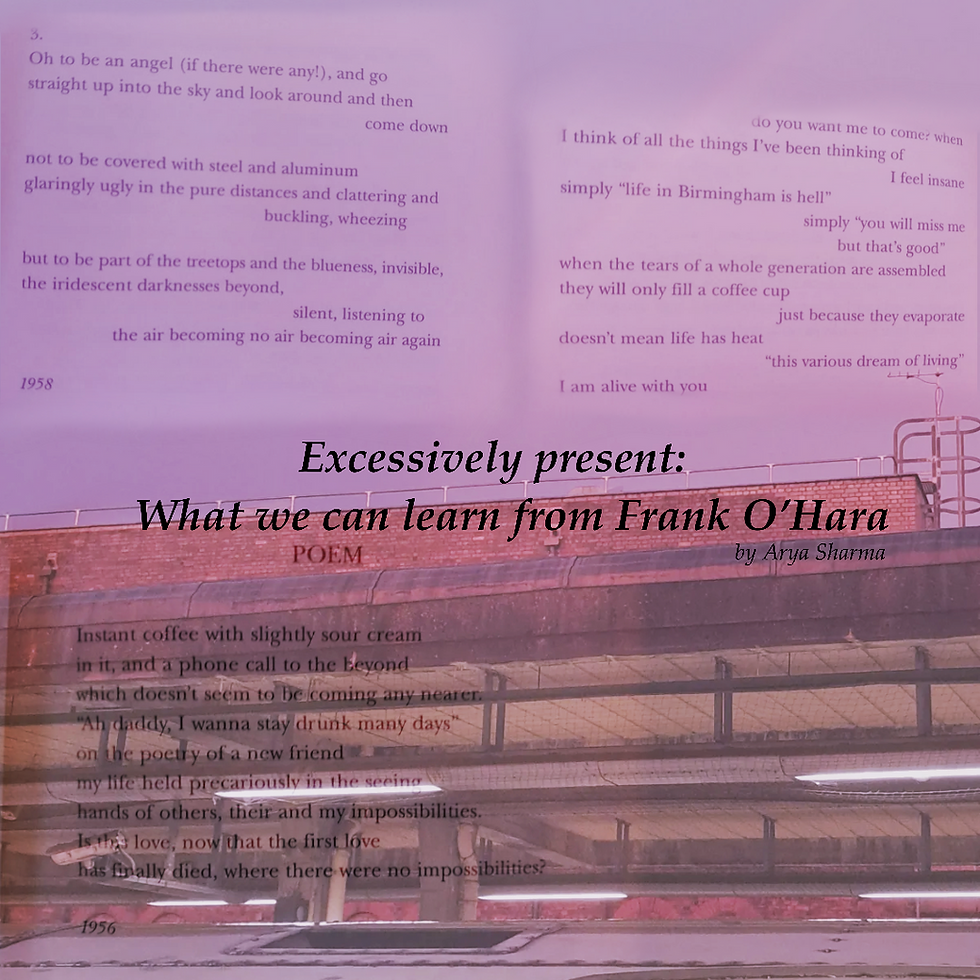Examining Fleetwood Mac’s enduring popularity
- caffeine conversations

- Aug 17, 2024
- 6 min read
Updated: Aug 19, 2025
What’s not to love about the infamous 1982 performance of Fleetwood Mac’s hit song, “The Chain?” Lindsay Buckingham’s unbridled, likely drug-fuelled rage as he faces Stevie Nicks, who stares back fiercely, stretching out her notes in wailing response. He shakes and shrieks, the song builds on their frenzy; it’s breathless, vicious, painful and ridiculously alluring. Why? Because, even if it is half a performance, it feels real. This is what audiences love more than anything, as each new genre declares itself more authentic than the last.
Toxic relationships can become repetitive cycles. Perhaps this is why the new TikTok generation loves Fleetwood Mac so much. It’s a blast from the past; the dark, mad ecstasy and fury of their music and very public dynamic. It becomes its own, never-ending story. Rumours is the band’s most popular album, a huge commercial success and considered one of the greatest albums of all time. And it is an album of multiple breakdowns. Keyboardist and vocalist Christine McVie and bassist John McVie had just divorced after eight years of marriage. They spoke to each other only about music. Lindsay and Stevie’s relationship was known to be tumultuous, and they apparently only stopped arguing when working on songs together. Drummer Mick Fleetwood had discovered his wife was cheating on him. And all the members had their own issues with substance abuse. Throughout their turmoil, they wrote their songs. They had no need to drop easter eggs and encourage fan detective work like some stars do today - they made it clear exactly what they were talking about. [1]
Stevie wrote “Dreams”; Lindsay responded with “Go Your Own Way”, both forced to sing each other’s songs, each casting blame on the other for the breakdown of their relationship. The simmering tension was palpable on stage, often bubbling to the surface. No wonder “The Chain” feels so visceral, with a chorus that goes, “If you don’t love me now, you will never love me again / I can still hear you saying / you’ll never break the chain.” A band so fractured and fragmented, yet here they were, all on the same stage for now, gaining immense success and profit from the ruins of their relationships.
So what’s the contemporary appeal? The glamorous drama? The romantic tragedy of showbiz destroying ‘true love’? Perhaps the petty, bitter nature of these biting lyrics? The appeal of making money off the people you love(d) and your own pain? On the last idea, I think of Robin James’ work, Resilience and Melancholy: Pop Music, Feminism, Neoliberalism (2015). Here, James outlines something called “resilience discourse,” which involves turning pain into profit.
By displaying their suffering under unfair societal standards, and then their journey of overcoming this suffering, women can present themselves as resilient and empowered. The act of “overcoming” must be witnessed. In turn, the presentation of overcoming can generate surplus value for viewers. James uses the example of the song “Sweet Nothing,” by Calvin Harris and Florence Welch. In the video, Welch works as a singer in a bar, performing songs about her abusive relationship, a meta presentation of suffering. As she performs, her abusive partner is attacked and beaten by a group of strangers. Later, we discover that this was organised by Harris’ character, who had listened to her recount the abuse. James describes Welch’s character as the “epitome of resilience,” as she “takes her personal damage and transforms it into aesthetic surplus value for others, both within the video and beyond the fourth wall, to consume” (James, p. 5) [2]. Our satisfaction and the potential for catharsis derives from the song, the character’s performance on stage, and her arc of suffering and ultimately “overcoming” it. This is all encapsulated within the song and the endlessly repeatable music video.
Fleetwood Mac epitomise this through a performance like that of “Silver Springs,” a song performed below some years after all the breakups and chaos. Still, the love and bittersweet attachment lingers, heart-wrenching and vicious on stage as Stevie sings to, and with Lindsay, “you’ll never get away from the sound of the woman that loved you.” They glance at each other; old attachments burst back to life. The story continues and you are allowed to bear witness. “You’ll never get away,” Stevie howls as the song draws to an end, and it’s for the audience as much as it is her former flame. As long as it feels real, it doesn’t matter if it is actually performative.
Through their vitriolic performances, which are recorded and thus endlessly repeatable, the band generates all this value. Their music creates space for catharsis, allows you to generate a moment to process your emotions. On stage, the moment can repeat each time in a new way. When it’s recorded, it can be repeated in the same way at different times, in different contexts. Endless cathartic possibilities, endless value. The fact that we are still watching them, still invested in them and their music, proves the value of their recorded moments. Live vicariously through them, access those emotions, even if the situation isn’t like yours, sing the songs and feel the things. It’s why we love music! And since these moments feel so raw and authentic, they become even more valuable. There’s lore, there’s a story, there’s more to it - more work for us to do if we really want to connect. And what does it mean to connect if not to know - know the songs, the lore, the reality behind the product. This is part of the process of ‘connecting’, of being a fan and consuming content in this way. It becomes more than what it is on the tin.
Moreover, there is something decidedly gendered and attuned to the female gaze at play in Stevie Nicks’ and Christine McVie’s different styles of emotional expression. Consider “Rhiannon” against “Songbird.” In the former, Nicks screams about a Welsh goddess, evoking markedly feminine, witchy, old world power. She is angry and self-righteous, and it is wonderful to witness. In contrast, on “Songbird,” McVie gently croons about love and sacrifice, voice and melody filled with longing and earnestness. She explains, “I wrote it in half an hour. Just stayed up late one night. I think I just was thinking of all the band members - ‘God, wouldn’t it be nice to just to happy?’” [3] Both tap into different types of suffering, power, desire and expression.
As documented in Rolling Stone and GQ, Fleetwood Mac fought bitterly, sometimes physically. So, when Stevie makes Lindsay sing her brutal songs about him, how could we not feel some sort of catharsis? The comments in the video for “Silver Springs” joke about her cursing him, casting a spell, and the power of making your ex sing your songs about him on stage with you. And the ‘chain’ connecting them (sorry, I had to) seems not to break, instead inspiring new content, such as Taylor Jenkins Reid’s novel and now TV series, Daisy Jones & The Six.
Reid describes the moment of inspiration being sparked by the performance of “Landslide,” where Lindsay watches Stevie sing, just the two of them on stage performing the acoustic ballad. “I wanted to write a story about that, about how the lines between real life and performance can get blurred and performance can get blurred, about how singing about old wounds might keep them fresh.” [4]
TikTok after Instagram reel using their songs, books and TV shows, speculation on what was and remains; Fleetwood Mac’s popularity seems undying and entwined with their dysfunctional nature as much as their beautiful music.
Generation after generation seems to be fascinated by this band - their music, performances, and the integral lore underpinning it all. There’s something about this narrative, this frenetic emotional rollercoaster, that makes people consume it eagerly. So much of life becomes content; an idea that only becomes truer with more and more invasive social media platforms emerging.
Perhaps we’re yearning for more authentic, emotionally raw musicians and artists. Fleetwood Mac being an older act feed into this sense of authenticity. There’s so much content to work through and it all feels like it was naturally born out of these artists, their lives, and what they wanted to express. Plus, we like living in the past. It’s easier to make it real by projecting whatever we want onto it. Through the space they operate within and continue to create, Fleetwood Mac were, and remain, everywhere.
Sources:
[1] https://www.gq-magazine.co.uk/culture/article/fleetwood-mac-daisy-jones-and-the-six-real-story-drama
[2] Robin James, Resilience and Melancholy: Pop Music, Feminism, Neoliberalism (2015)
[4] https://www.vanityfair.com/hollywood/2023/03/daisy-jones-and-the-six-based-on-band-fleetwood-mac





Comments